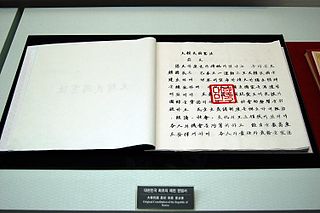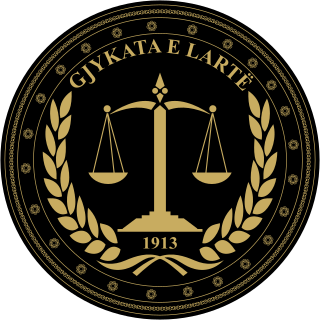Related Research Articles

The politics of Pakistan takes place within the framework established by the constitution. The country is a federal parliamentary republic in which provincial governments enjoy a high degree of autonomy and residuary powers. Executive power is vested with the national cabinet which is headed by the prime minister, who works coherently along with the bicameral parliament and the judicature. Stipulations set by the constitution provide a delicate check and balance of sharing powers between executive, legislative, and judicial branches of the government.

The President of the Republic of South Africa is the head of state, head of government of South Africa and the commander-in-chief of the South African National Defence Force (SANDF) under the Constitution of South Africa. From 1961 to 1994, the head of state was called the state president.

The Constitution of South Africa is the supreme law of the Republic of South Africa. It provides the legal foundation for the existence of the republic, it sets out the rights and duties of its citizens, and defines the structure of the Government. The current constitution, the country's fifth, was drawn up by the Parliament elected in 1994 in the South African general election, 1994. It was promulgated by President Nelson Mandela on 18 December 1996 and came into effect on 4 February 1997, replacing the Interim Constitution of 1993.

The current Constitution of the Russian Federation was adopted by national referendum on December 12, 1993. Russia's constitution came into force on December 25, 1993, at the moment of its official publication, and abolished the Soviet system of government. The current Constitution is the second most long-lived in the history of Russia, behind the Constitution of 1936.

The Constitutional Court of South Africa is a supreme constitutional court established by the Constitution of South Africa. It was originally the final appellate court for constitutional matters. Since the enactment of the Seventeenth Amendment of the Constitution in 2013, the Constitutional Court has jurisdiction to hear any matter if it is in the interests of justice for it to do so.

The Chief Justice of South Africa is the most senior judge of the Constitutional Court and head of the judiciary of South Africa, who exercises final authority over the functioning and management of all the courts.

The Constitution of the Republic of Singapore is the supreme law of Singapore. A written constitution, the text which took effect on 9 August 1965 is derived from the Constitution of the State of Singapore 1963, provisions of the Federal Constitution of Malaysia made applicable to Singapore by the Republic of Singapore Independence Act 1965, and the Republic of Singapore Independence Act itself. The text of the Constitution is one of the legally binding sources of constitutional law in Singapore, the others being judicial interpretations of the Constitution, and certain other statutes. Non-binding sources are influences on constitutional law such as soft law, constitutional conventions, and public international law.

The Constitution of the Republic of Korea is the supreme law of South Korea. It was promulgated on July 17, 1948, and was last revised on October 29, 1987.

The judiciary of South Africa is the body of judges and magistrates who sit in the courts of South Africa. The judiciary is an independent branch of the government, subject only to the Constitution of South Africa and the laws of the country. The Judiciary interprets the law of South Africa, using as the basis of its interpretation the laws enacted by the South African Parliament as well as explanatory statements made in the legislature during the enactment.

In Greece, the Council of State is the Supreme Administrative Court of Greece.

The judicial officers of the Republic of Singapore work in the Supreme Court and the State Courts to hear and determine disputes between litigants in civil cases and, in criminal matters, to determine the liability of accused persons and their sentences if they are convicted.

The current Constitution of Mauritania was adopted on 12 July 1991. There have been several constitutions since Mauritania's independence in 1960.

The Constitutional Court of the Republic of Indonesia is a court in Indonesia which is part of Judicial branch of Government of Indonesia. Its primary role is the reviewing of constitutionality under the Constitution. It also has administrative law functions such as ruling on competence disputes between governmental entities, giving final decisions on impeachments, and making judgments on the dissolution of political parties.

The Judicial Commission of Indonesia was established as a consequence of the third amendment to the Constitution of Indonesia ratified by the Indonesian People's Consultative Assembly on 9 November 2001. The Commission's duty is to monitor the performance of judges, advise the House of Representatives on judicial appointments and review community complaints about the behavior and fairness of presiding judges.

The Constitution of the Republic of Singapore Tribunal was established in 1994 pursuant to Article 100 of the Constitution of the Republic of Singapore. Article 100 provides a mechanism for the President of Singapore, acting on the advice of the Singapore Cabinet, to refer to the Tribunal for its opinion any question as to the effect of any provision of the Constitution which has arisen or appears to likely to arise. Questions referred to the Tribunal may concern the validity of enacted laws or of bills that have not yet been passed by Parliament.

The Constitution of Kenya is the supreme law of the Republic of Kenya. There have been three significant versions of the constitution, with the most recent redraft being enabled in 2010. The 2010 edition replaced the 1963 independence constitution. The constitution was presented to the Attorney General of Kenya on 7 April 2010, officially published on 6 May 2010, and was subjected to a referendum on 4 August 2010. The new Constitution was approved by 67% of Kenyan voters. The constitution was promulgated on 27 August 2010.

The Supreme Court of the Republic of Albania is the highest court of Albania and is the final court of appeal in the judicial system of Albania. It is composed of seventeen judges, the Chief Justice and sixteen Members.
The Deputy Chief Justice of South Africa is a judge in the Constitutional Court of South Africa and the second-highest judicial post in the Republic of South Africa, after the Chief Justice. The post, originally called "Deputy President of the Constitutional Court", was created in September 1995 by the Constitution of the Republic of South Africa Second Amendment Act, 1995, which was an amendment to the Interim Constitution. The position was retained by the final Constitution which came into force in February 1997. In November 2001 the Sixth Amendment of the Constitution of South Africa restructured the judiciary, and the post was renamed to "Deputy Chief Justice".
The Seventeenth Amendment of the Constitution of South Africa made a number of changes to the structure of the South African judiciary. The bill for the amendment was passed by the National Assembly on 20 November 2012 with the required two-thirds majority; because it is a constitutional amendment not affecting the provinces it was not required to be voted on by the National Council of Provinces. The act was signed by President Jacob Zuma on 1 February 2013, and a presidential proclamation brought it into force on 23 August 2013. The amendment came into force simultaneously with the Superior Courts Act, 2013, which implemented a major rationalisation and restructuring of the judicial system.
The 19th Amendment (19A) to the Constitution of Sri Lanka was passed by the 225-member Sri Lankan Parliament with 215 voting in favor, one against, one abstained and seven were absent, on 28 April 2015. The amendment envisages the dilution of many powers of Executive Presidency, which had been in force since 1978. It is the most revolutionary reform ever applied to the Constitution of Sri Lanka since JR Jayawardhane became the first Executive President of Sri Lanka in 1978.
References
- ↑ "Constitution of the Republic of South Africa Amendment Bill; Constitution of the Republic of South Africa Second Amendment Bill; Judges' Remuneration and Conditions of Employment Bill (Second Reading debate)". Parliamentary Debates (Hansard) . Republic of South Africa: National Assembly. 1 November 2005. p. 86. Retrieved 16 May 2020.
